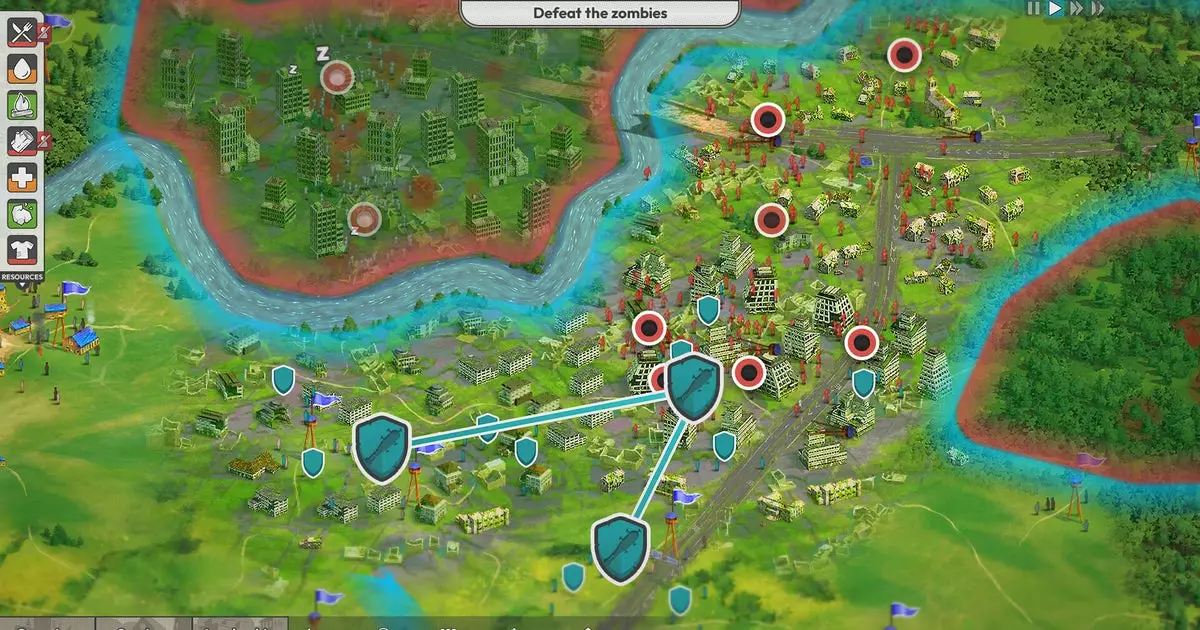The video game industry has a long history of exploring themes of apocalypse and rebirth, allowing players to navigate the complexities of survival and restoration in ruined landscapes. Following the success of Ndemic Creations’ Plague Inc., which allowed users to simulate the spread of disease, the developer’s upcoming title, *After Inc: Revival*, promises to deliver a unique blend of strategy and resource management in a post-zombie apocalypse setting. As we dive deeper into this title and its implications, it is essential to consider not just the gameplay mechanics, but also the underlying commentary it might have on societal anxieties in the wake of the global pandemic.
*Plague Inc.* was a game that garnered significant attention during the onset of the COVID-19 pandemic, as players sought to conceptualize the chaos around them. It is intriguing to note that after manifesting an end-of-world scenario, Ndemic Creations pivoted to a hopeful narrative in *After Inc: Revival*. The shift from destroying the world to rebuilding it reflects a desire for catharsis and redemption, allowing players to engage with themes of resilience. Set in a post-apocalyptic United Kingdom, players are given the chance to construct and manage settlements, contrasting starkly with the sense of desolation felt in *Plague Inc.*.
The visual aesthetics of *After Inc* evoke a quaint yet eerie charm, presenting a world where remnants of civilization harmonize with nature’s reclamation. The depiction of “cozy blue rooftops” amidst “overgrown city blocks” draws parallels to society’s yearning for recovery and normalcy post-pandemic. The game encourages hopeful reconstruction amid lingering threats.
One of the intriguing aspects of *After Inc: Revival* is its focus on the social dynamics players must navigate while building their societies. The game posits challenging moral dilemmas, asking whether children are a luxury that should be preserved or whether they should be sacrificed for immediate survival. This echoes real-world discussions about resource allocation in dire situations, thereby enhancing the game’s relevance. Furthermore, the dialogue surrounding democracy and authoritarianism hints at deeper societal questions that resonate in today’s geopolitical landscape.
By incorporating a system that prioritizes player agency in shaping society, the game taps into the psychological complexities that arise during times of crisis. The option to exterminate zombie infestations, while crucial for survival, creates an additional layer of strategy in preserving humanity. Players must balance growth against the looming threat of the undead, which may embody fears of uncontrollable circumstances—whether real or metaphorical.
Another promising feature of *After Inc: Revival* is its attempt to integrate realistic zombie behavior, lending a layer of authenticity to the gameplay. The incorporation of sophisticated narrative algorithms adds further depth, allowing for a personalized experience shaped by player decisions. Ndemic Creations aims to enhance player immersion, driving home the notion that the outcomes in the game are reflective of both strategic thinking and ethical considerations.
Moreover, the introduction of diverse character leaders, each with unique abilities, enables players to explore various governance styles and their implications on society building. This aspect promotes a rich tapestry of gameplay possibilities, keeping the experience dynamic and engaging.
While *After Inc: Revival* is certainly grounded in fantastical elements, it would be remiss not to consider the game as a commentary on contemporary issues. The playful acknowledgment in marketing that it is not based on any realistic scenario sits uncomfortably against the serious backdrop of a world still grappling with the pandemic’s effects. This juxtaposition leads one to ponder whether the game may inadvertently echo the sanitized narratives of a “return to normal,” glossing over the ongoing realities of the COVID-19 crisis.
*After Inc: Revival* stands as a multilayered amalgamation of strategy, morality, and societal reflection. While the game invites players to build anew from the ruins of a zombie-infested world, it also evokes real-world anxieties. As we engage with the game, we must remain vigilant about the narratives we construct in our own societies, especially in a world still coping with the ramifications of a global pandemic. The course of rebuilding may demand much more than creative strategy—it may require a profound understanding of the complexities of humanity itself.

